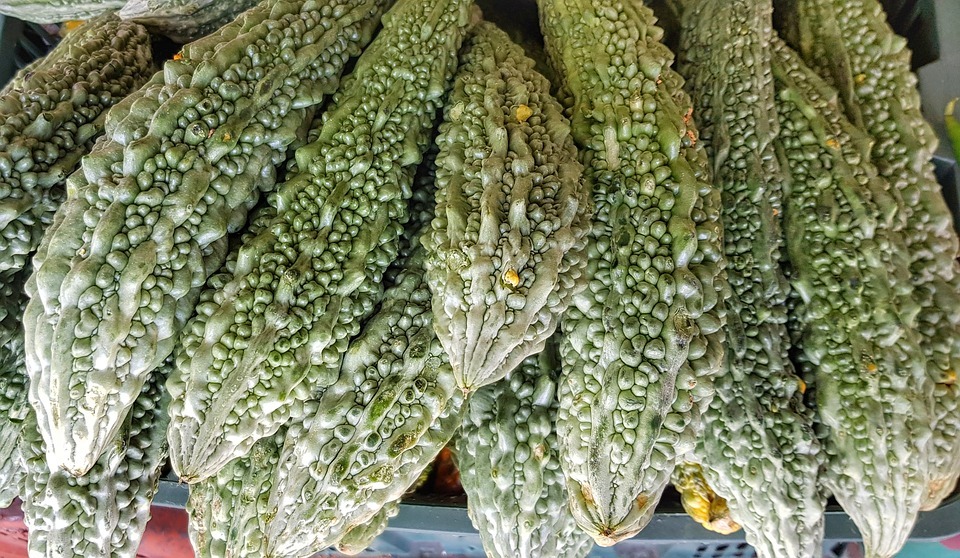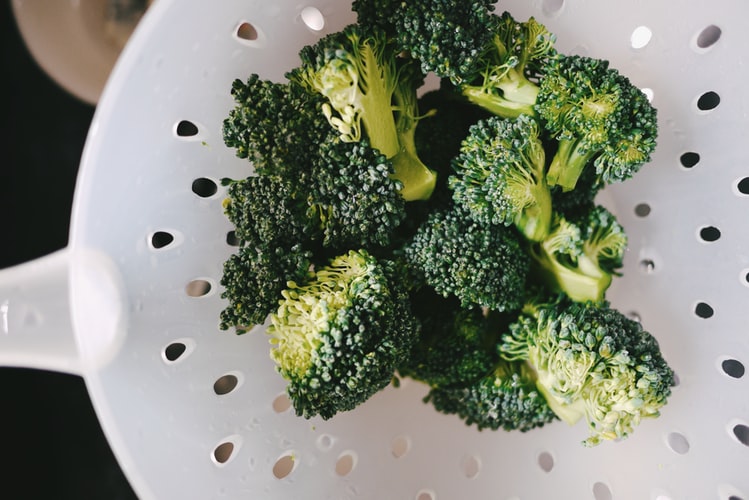Turmeric Root Juice: Anti-Inflammatory Benefits for Joint Health
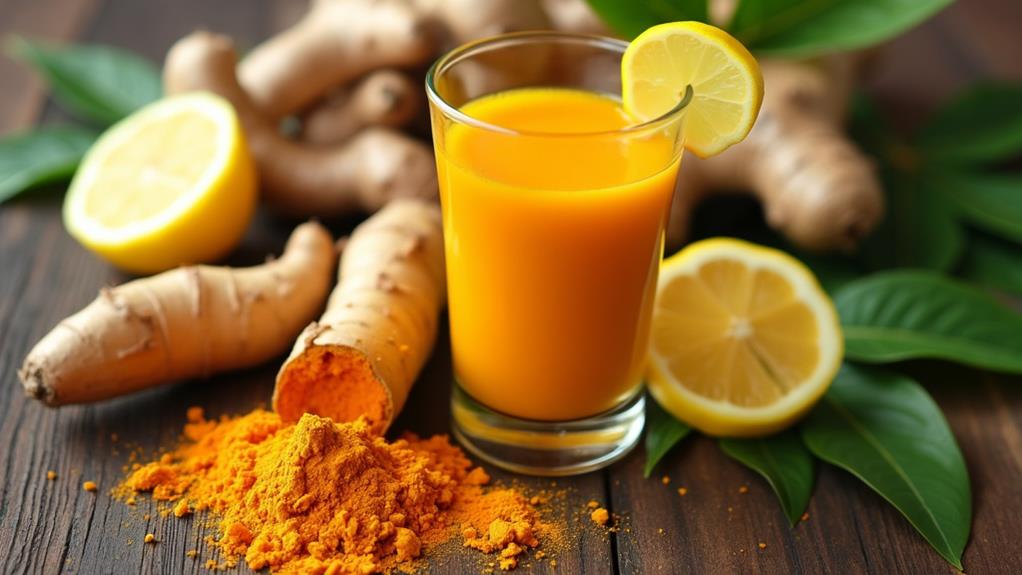
Turmeric root juice is a golden powerhouse for your joint health, thanks to its high curcumin content. It helps ease inflammation linked to arthritis and joint pain by blocking inflammatory pathways and reducing the production of pro-inflammatory cytokines. Regular intake can improve your joint function and mobility while alleviating symptoms like stiffness. Pairing turmeric juice with black pepper amplifies curcumin absorption, enhancing its benefits. However, it's crucial to be careful if you're on medication, as turmeric can interact with certain drugs. Exploring further could reveal strategies to optimize its potential and avoid pitfalls.
Understanding Turmeric Root Juice
Turmeric root juice, a lively golden liquid, comes from the Curcuma longa plant and packs a powerful punch thanks to its high curcumin content. You'll find that this juice is a promising ally for joint health. Curcumin, with its renowned anti-inflammatory properties, is essential to managing inflammation-related conditions like arthritis. Studies show it can reduce symptoms and alleviate joint pain, offering relief comparable to non-steroidal anti-inflammatory drugs (NSAIDs).
For those dealing with osteoarthritis or rheumatoid arthritis, incorporating turmeric root juice into your routine might be worth considering. However, curcumin's effectiveness depends greatly on its bioavailability. Without proper absorption, the body cannot fully utilize its benefits. This is where black pepper plays a vital role. It contains piperine, which improves curcumin absorption, making the juice even more effective in combating inflammation.
Anti-Inflammatory Properties
A key component of turmeric root juice's powerful anti-inflammatory properties is curcumin, a compound that effectively reduces inflammation linked to arthritis and joint pain. You might not realize just how potent this natural remedy is. Studies have shown that curcumin's effects can rival those of nonsteroidal anti-inflammatory drugs (NSAIDs), offering a natural alternative for those seeking relief from discomfort. Turmeric root juice's bioactive compounds work by inhibiting inflammatory pathways, blocking the activity of nuclear factor kappa B (NF-kB), a key player in chronic inflammation. This means less swelling and pain for you, especially if you're dealing with osteoarthritis.
To really optimize the benefits, consider these steps:
- Regular Consumption: Consuming turmeric root juice regularly may greatly improve joint function and decrease osteoarthritis symptoms.
- Improved Absorption: Pairing turmeric with black pepper can enhance curcumin absorption, increasing its anti-inflammatory benefits.
- Natural Alternative: Using turmeric root juice as an alternative to NSAIDs may help manage joint pain without the side effects of pharmaceutical drugs.
Benefits for Joint Health

Many swear by the benefits of turmeric root juice for joint health. If you're dealing with osteoarthritis or rheumatoid arthritis, this golden elixir might be your ticket to relief. Turmeric is packed with curcumin, a powerhouse compound renowned for its anti-inflammatory effects. It works wonders by reducing inflammation and pain, much like NSAIDs such as ibuprofen, but without the side effects.
By incorporating turmeric root juice into your routine, you may notice improved joint mobility. Curcumin helps mitigate inflammation and swelling, making it easier for you to move freely and comfortably. This can be particularly beneficial if you're struggling with joint stiffness or limited movement.
Moreover, the antioxidant properties of curcumin shield your joint tissues from oxidative stress and damage. This protection can potentially slow down the progression of degenerative joint diseases, preserving your joint health for longer. As you continue to enjoy turmeric root juice, you might experience a significant improvement in your general quality of life. Reduced joint pain and increased mobility mean you can engage in everyday activities with greater ease and less discomfort, making life a little brighter and more enjoyable.
Curcumin's Role in Relief
For those seeking relief from joint pain, curcumin plays an essential role in alleviating discomfort associated with conditions like osteoarthritis and rheumatoid arthritis. This powerful compound, found in turmeric, showcases potent anti-inflammatory properties that target joint inflammation and pain. Research suggests that curcumin can be as effective as non-steroidal anti-inflammatory drugs (NSAIDs) like ibuprofen, offering a natural alternative for managing joint pain.
Curcumin aids your joint health by:
- Inhibiting Inflammatory Pathways: It reduces the production of pro-inflammatory cytokines, which are major contributors to joint inflammation and pain.
- Improving Physical Function: Studies have shown that individuals with osteoarthritis who took curcumin supplements for 8 weeks experienced significant improvements in joint pain and mobility.
- Augmenting Absorption: To optimize its benefits, curcumin's bioavailability is increased when combined with piperine (found in black pepper), increasing absorption by up to 2000%.
Incorporating turmeric root juice into your diet can provide a more effective source of curcumin, especially when paired with piperine. As you investigate natural remedies for joint pain, consider curcumin supplements or turmeric products to potentially boost your joint health and general well-being.
Enhancing Bioavailability
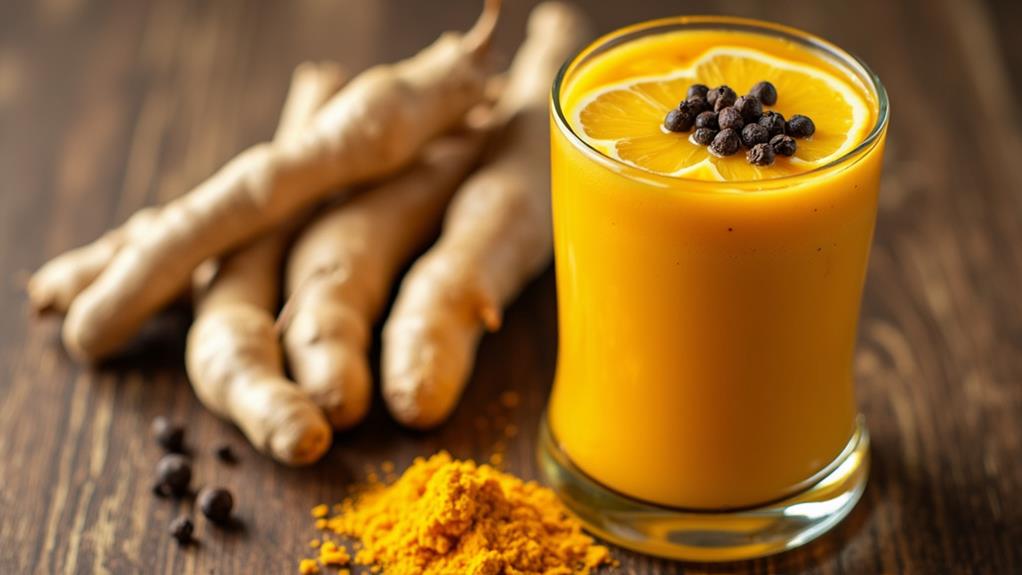
Understanding curcumin's potential for joint health leads us to the challenge of maximizing its impact through improved absorption. Curcumin, the powerful anti-inflammatory compound in turmeric, has notoriously low bioavailability, with only about 1% making it into your bloodstream. But don't worry, there are ways to increase this. Pairing turmeric with black pepper is a simple yet effective method. Black pepper contains piperine, a compound that can improve curcumin absorption by up to 2,000%. This combination greatly enhances turmeric's effectiveness in supporting joint health.
Another approach is to incorporate dietary fats into your turmeric intake. Curcumin is fat-soluble, meaning it dissolves better in fats, which improves its absorption. Cooking turmeric with healthy fats like coconut or olive oil can make a noticeable difference. Liposomal formulations of curcumin are also available, designed to enhance bioavailability and guarantee more of the compound is effectively absorbed by your body.
Regularly including turmeric in your diet through food rather than high-dose supplements is generally preferred. This approach helps you manage curcumin's bioavailability challenges while reducing potential side effects, making it a sustainable choice for joint health.
Safe Consumption Tips
In terms of safely enjoying turmeric root juice, moderation is key. Consuming 1-2 teaspoons per day can help you harness its anti-inflammatory benefits without exceeding recommended dosages. To enhance curcumin absorption, pair your turmeric juice with a pinch of black pepper, which can increase absorption by up to 2000% and amplify its effectiveness for joint health.
Here are some tips to guarantee safe consumption:
- Consult a healthcare provider: Before you start incorporating turmeric root juice into your diet, especially if you're on anticoagulant medications or have specific health conditions, it's best to discuss it with a healthcare provider to confirm it's suitable for you.
- Start small: To prevent gastrointestinal discomfort, begin with small amounts of turmeric juice. Gradually increase your intake as tolerated to allow your body to adjust and avoid potential stomach issues.
- Dilute for better taste and tolerance: Mix turmeric juice with water or blend it into smoothies. This not only improves the taste but also minimizes potential stomach irritation, making sure you still receive its health benefits.
Potential Drug Interactions
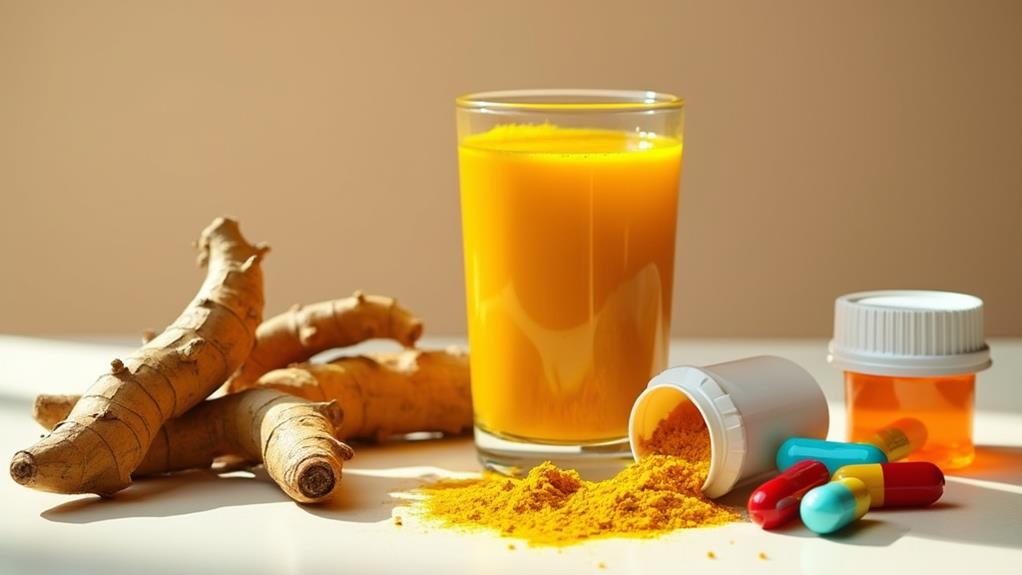
Curious about how turmeric might interact with medications you're taking? It's crucial to be aware of potential interactions, especially if you're considering turmeric for joint health. Turmeric can interact with anticoagulants like warfarin, increasing the risk of bleeding due to its natural blood-thinning properties. If you're on such medications, consult your healthcare provider before incorporating turmeric into your regimen.
High doses of turmeric may also reduce the effectiveness of certain pain relievers, including aspirin and ibuprofen. This could mean that your usual pain management strategies might need adjustment if turmeric becomes part of your daily routine. For those undergoing cancer treatment, turmeric supplements could interfere with chemotherapy agents. This interaction calls for caution and a discussion with your oncologist to avoid any adverse effects.
If you're managing diabetes, combining turmeric with diabetes medications might lead to excessively low blood sugar levels. Monitoring your blood glucose closely is essential to prevent any potential health issues. Furthermore, high doses of turmeric could impact liver metabolism, affecting how medications processed by liver enzymes work in your body. Always consult your healthcare provider to guarantee safe and effective use of turmeric alongside your current medications.


